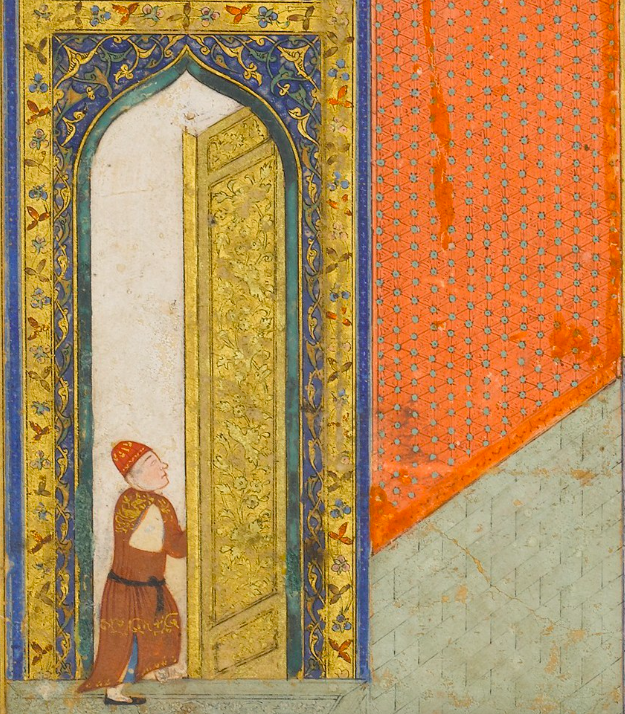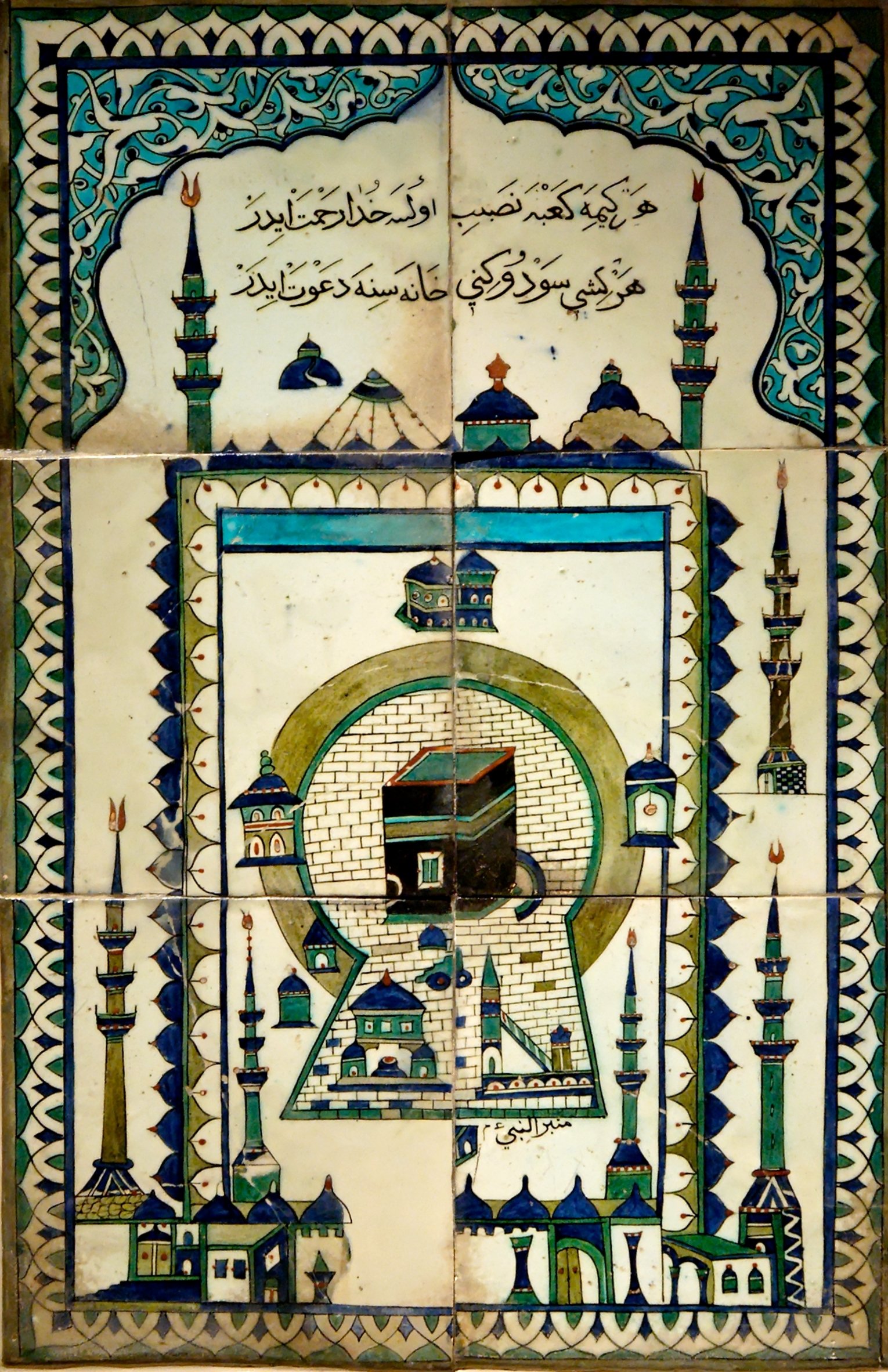A 12th-century execution and the mixed messages in the chronicles around how things had gotten to that point. Did William with the Long Beard offer a better life to those unhappy in Richard I's London, or did he just take advantage of their misery to serve his own vices?
Medieval Lives 10: Pietro d'Abano
Born in the 13th century, Pietro d'Abano was referred to variously as “the Great Lombard,” “the Conciliator,” and, in at least one case, a “great necromancer.” This scholar and physician faced variously troubles relating to heresy or sorcery, and stories swirl around him of calling on demons or magically making spent coins return to his purse.
Medieval Lives 9: John Crabbe
Medieval Lives 8: Giovanni Fontana
Medieval Lives 7: Long Distance Relationships
Detail from Piri Ries’ 16th-century map of Cairo - (Wikimedia)
With all the medieval travel featured on the podcast—the trips across the Mediterranean, the Asian Steppe, and the Indian Ocean—of course we focus on the travellers themselves, the people actually making those trips, but whether they were merchants, envoys, or otherwise, they often left people behind, family that they were separated from for years at a time.
This episode is about those separations, the difficulties they caused, and what people did (or did not do) about them. We start with a letter from a merchant in Palermo, Sicily, move to one from an India trader in Aden, and finish with a pair of Rabbinic responses regarding a married couple in Egypt.
If you like what you hear and want to chip in to support the podcast, my Patreon is here.
3 Things:
Article by Heather Dalton on the travels of a cockatoo to 13th-century Sicily.
Blog post about the correspondence of a "happy family" in 2nd-century Egypt.
Sources:
Goitein, S.D. Letters of Medieval Jewish Traders. Princeton University Press, 1973.
Hofmeester, Karin. “Jewish Ethics and Women’s Work in the Late Medieval and Early Modern Arab-Islamic World.” International Review of Social History 56 (2011): 141–64.
Melammed, Reneé Levine. “He Said, She Said: A Woman Teacher in Twelfth-Century Cairo.” AJS Review 22, no. 1 (1997): 19–35.
Medieval Lives 6: Wuhsha the Broker
Fragment of testimony on Wuhsha’s child - (Princeton Geniza Project)
Today's episode takes us to medieval Egypt, to old Cairo in the 11th and 12th century, to Fustat, to the Fatimid Caliphate during the period of the First Crusade, and to the life of a medieval woman named Wuhsha al-dallala who stands out in her time for strength, independence, and wild financial success (through lending and investment in trading ventures, including one to Gujarat, India). Her history comes to us through the fragments of the Cairo Geniza, in legal documents, and in a will.
If you like what you hear and want to chip in to support the podcast, my Patreon is here.
Sources:
Abramson, Henry. "Wuhsha the Broker Jewish Women in the Medieval Economy." December 6th, 2012, lecture.
Frenkel, Miriam. "Charity in Jewish Society of the Medieval Mediterranean World." In Charity and Giving in Monotheistic Religions, edited by Miriam Frenkel & Yaacov Lev. Walter de Gruyter, 2009.
Goitein, S. D. A Mediterranean Society, Volume III: The Family. University of California Press, 1978.
Goitein, S. D. “A Jewish Business Woman of the Eleventh Century.” The Jewish Quarterly Review 57 (1967): 225–42.
Goitein, S. D. & Friedman, Mordechai Akiva. India Traders of the Middle Ages: Documents from the Cairo Geniza. Brill, 2008.
Hoffman, Adina & Cole, Peter. Sacred Trash: The Lost and Found World of the Cairo Geniza. Knopf, 2011.
Zinger, Oded. Women, gender and law: Marital disputes according to documents of the Cairo Geniza. Princeton University, 2014.
Brutus of Troy
Illuminated initial from Geoffrey of Monmouth's Historia regum Britanniae - (British Library)
The story of the legendary first kings of the Britons, complete with prophecy, a divine appearance, and a number of origin myths behind the names of Tours, Cornwall, New Troy, and Britain itself.
For this episode, we go to Geoffrey of Monmouth's chronicles for Britain's mythical Trojan origins, following Brutus of Troy as he receives visions from the goddess Diana and voyages to an Albion still inhabited by giants.
If you like what you hear and want to chip in to support the podcast, my Patreon is here.
Sources:
Armitage, David. The Ideological Origins of the British Empire. Cambridge University Press, 2000.
Geoffrey of Monmouth. History of the Kings of Britain, translated by Aaron Thompson. In parentheses Publications Medieval Latin Series, 1999.
Gillingham, John. The English in the Twelfth Century: Imperialism, National Identity, and Political Values. Boydell Press, 2000.
Jeffs, Amy. Storyland: A New Mythology of Britain. riverrun, 2021.
Lavezzo, Kathy. Imagining a Medieval English Nation. University of Minnesota Press, 2004.
Spence, John. Reimagining History in Anglo-Norman Prose Chronicles. York Medieval Press, 2013.
Valerie I. J. Flint. “The Historia Regum Britanniae of Geoffrey of Monmouth: Parody and Its Purpose. A Suggestion.” Speculum 54, no. 3 (1979): 447–68.
Medieval Lives 5: The Consorts of the Caliphs
Fragments of 9th-Century Wall Paintings from Dar al-Khilafa, Samarra, Iraq - (Wikimedia)
Tāj al-Dīn ‘Alī ibn Anjab ibn al-Sā’ī was born in the last years of the 12th century and lived until the last quarter of the 13th. He was a prolific writer who grew up Abbasid Baghdad and saw it fall to the Mongol invasion of Hulagu Khan, grandson of Genghis Khan.
His solitary work that survives in its entirety is Consorts of the Caliphs: Women and the Court of Baghdad. In that book, he reaches all the way back to Hammādah bint ‘Īsā, who was married to al-Mansūr the Abbasid dynastic founder and died in 780, and all the way up to Shāhān, a contemporary of his and the concubine of al-Mustansir who died in 1242. He fills its pages with the women of the Abbasid caliphal court, women who appear there as wives, concubines, poets, and more. This episode is about some of those medieval women.
If you like what you hear and want to chip in to support the podcast, my Patreon is here.
Sources:
Ibn al-Sā'ī. Consorts of the Caliphs: Women and the Court of Baghdad, edited by Shawkat M. Toorawa. New York University Press, 2015.
Caswell, F.M. The Slave Girls of Baghdad: The Qiyan in the Early Abbasid Era. Bloomsbury Publishing, 2011.
Medieval Lives 4: Chen Cheng, his Travels, and his Troubles at Work
Detail from a 15th-century illustrated telling of a Nizami story, commissioned in Herat. (Met Museum)
A standalone episode on medieval diplomacy, on the travels, career, and narrative of a 14th and 15th century Ming Dynasty diplomat and administrator, and on the history around him. Chen Cheng would suffer professional setbacks outside of his control, as the the Jianwen Emperor would be replaced by the Yongle Emperor, and he would make the overland journey from China to see Shah Rukh, the son of Timur (Tamerlane), in Timurid Herat.
If you like what you hear and want to chip in to support the podcast, my Patreon is here.
Sources:
Hecker, Felicia J. “A Fifteenth-Century Chinese Diplomat in Herat.” Journal of the Royal Asiatic Society 3, no. 1 (1993): 85–98.
Rossabi, Morris. “Two Ming Envoys to Inner Asia.” T’oung Pao 62, no. 1/3 (1976): 1–34.
Medieval Lives 3: An Anonymous Journey to Mecca
A 17th-century depiction of Mecca currently held by the Louvre. (Wikimedia)
Today's episode centres on an anonymous 16th-century account of the Hajj that first appeared in English in a 1599 Hakluyt publication.
If you like what you hear and want to chip in to support the podcast, my Patreon is here.
Sources:
Hakluyt, Richard. The Principal Navigations, Voyages, Traffiques & Discoveries of the English Nation. James MacLehose and Sons, 1904.
One Thousand Roads to Mecca: Ten Centuries of Travelers Writing about the Muslim Pilgrimage, edited by Michael Wolfe. Grove Atlantic, 2015.
The Hajj: Pilgrimage in Islam. edited by Eric Tagliacozzo & Shawkat M. Toorawa. Cambridge University Press, 2016.
Peters, F.E. The Hajj: The Muslim Pilgrimage to Mecca and the Holy Places. Princeton University Press, 2021.






